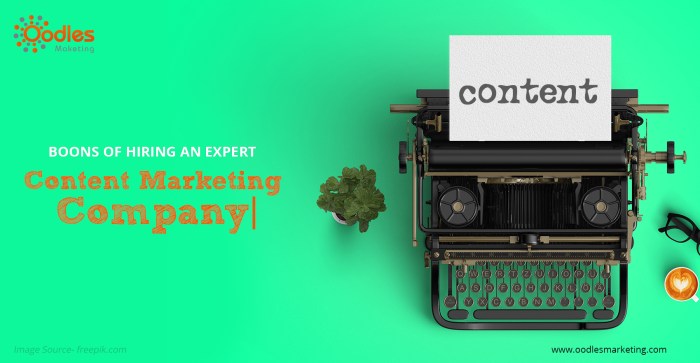Three things to consider when hiring a content marketing agency: Understanding their needs, evaluating their expertise, and grasping their value proposition. Choosing the right agency can significantly impact your content marketing strategy, ensuring you get the results you’re after. This involves more than just picking a name; it’s about careful consideration of their approach, experience, and overall fit with your brand.
This in-depth look delves into the crucial aspects of selecting a content marketing agency, from defining your needs and evaluating their capabilities to understanding their value proposition and ensuring a transparent relationship. We’ll cover essential considerations for a successful partnership, ensuring your investment delivers measurable results. Ultimately, this guide empowers you to make informed decisions and secure a strong content marketing partner.
Defining Content Marketing Agency Needs

Choosing the right content marketing agency is crucial for boosting your brand’s visibility and achieving your marketing goals. A successful partnership requires meticulous consideration of the agency’s capabilities, services, and understanding of your target audience. This guide will walk you through the essential elements to look for in a content marketing agency.A strong content marketing agency demonstrates a deep understanding of the evolving digital landscape.
They aren’t just churning out content; they’re strategic partners who craft compelling narratives aligned with your business objectives. They also excel at data analysis, adapting their strategies based on performance metrics, ensuring a positive return on investment (ROI).
Characteristics of a Successful Content Marketing Agency
A successful content marketing agency possesses a unique blend of creativity, technical expertise, and business acumen. They should be able to produce high-quality content across various platforms, adapting their approach to suit the specific needs of each client. Their work should consistently align with the client’s branding guidelines and objectives.
Essential Skills and Experience
A content marketing agency should have a team equipped with a diverse skill set. Essential skills include strong writing and editing capabilities, understanding of best practices, social media marketing expertise, and visual content creation skills. Significant experience in content creation for various industries and platforms is also crucial. A proven track record of success, demonstrated through case studies and client testimonials, is a strong indicator of their ability to deliver results.
Types of Content Marketing Services
Content marketing agencies offer a wide array of services, from developing engaging blog posts to creating compelling social media content and producing high-quality videos. These services often include content strategy development, research, content calendar creation, and even social media management. Their services should be tailored to your specific needs and goals.
- Blog Post Creation: Agencies proficient in blog post creation understand the importance of optimization, compelling narratives, and consistent posting schedules to drive organic traffic and establish thought leadership. This involves not only writing, but also conducting thorough research, analyzing target s, and structuring content for optimal readability.
- Social Media Content: An agency should understand the nuances of different social media platforms, crafting engaging content tailored to each platform’s unique audience and characteristics. They should also be adept at scheduling, monitoring, and responding to comments and messages.
- Video Production: Video production services range from simple explainer videos to complex animated productions. An effective agency will understand your target audience’s preferences and utilize the right video format and style to achieve the desired impact.
- Content Strategy Development: A strong content strategy is essential. A competent agency will collaborate with you to define your target audience, key messages, and content pillars. This involves understanding your brand’s voice and values, and crafting a cohesive content plan.
Understanding Your Target Audience
A content marketing agency must possess a deep understanding of your target audience. They should be able to identify their needs, pain points, and preferences to create content that resonates with them. This understanding should inform the tone, style, and messaging of all content. Successful agencies employ data analysis and audience research to create effective content strategies.
Content Marketing Agency Service Packages
| Service Package | Description | Pricing Example |
|---|---|---|
| Basic Package | Includes blog post writing, social media management, and basic . | $1,500-$3,000/month |
| Standard Package | Includes all elements of the Basic Package plus video production and content strategy development. | $3,000-$6,000/month |
| Premium Package | Includes all elements of the Standard Package plus advanced , influencer marketing, and custom website content creation. | $6,000-$10,000+/month |
Evaluating Agency Expertise and Capabilities
Choosing the right content marketing agency is crucial for achieving your business goals. Beyond understanding their needs, evaluating their expertise and capabilities is vital. This involves a thorough assessment of their skills, experience, and service models to ensure they align with your specific requirements and long-term strategy.A successful partnership hinges on a content marketing agency’s demonstrable expertise in crafting engaging content that resonates with your target audience and drives tangible results.
Picking the right content marketing agency is key. Three crucial things to consider are experience, strategy, and, of course, the budget. A significant factor often overlooked is the potential cost of email marketing campaigns. Understanding the cost of email marketing is essential for creating a realistic budget. Ultimately, a transparent and communicative agency that aligns with your goals will serve you best.
This assessment involves understanding their approach to content creation, their understanding of your industry, and their capacity to adapt to evolving market trends. Crucially, it involves examining their past performance through case studies and portfolios.
Different Approaches to Evaluating Capabilities
Evaluating a content marketing agency’s capabilities involves multiple approaches. Scrutinizing their processes for content creation, from ideation to distribution, is essential. Assessing their understanding of your industry and target audience is equally critical. Understanding their approach to data analysis and performance tracking provides insights into their commitment to measurable results.
Questions to Ask During a Consultation
Asking insightful questions during a consultation can reveal valuable information about an agency’s capabilities. These questions should go beyond basic introductions and delve into their specific approach to content marketing. Examples of pertinent questions include:
- What is your agency’s approach to understanding client objectives and aligning content strategies with those goals?
- Can you provide examples of content formats and strategies that have proven successful for similar businesses?
- How does your agency stay abreast of evolving content marketing trends and technologies?
- What is your process for measuring the effectiveness of content marketing campaigns and providing regular performance reports?
- How do you manage and maintain content calendars and ensure consistent content delivery?
Agency Service Models
Understanding the different agency service models is crucial. A retainer model provides ongoing support and content creation, while a project-based approach offers focused support for specific tasks or campaigns. The best model depends on your specific needs and budget. Consider the flexibility and scalability offered by each model when making your choice.
- Retainer Model: This model involves a long-term contract with ongoing support, making it ideal for businesses with consistent content needs. It provides a steady flow of content and allows for ongoing optimization and strategy refinement.
- Project-Based Model: This model is suitable for businesses with short-term or specific content needs, offering focused support for specific campaigns or tasks. It’s more flexible and cost-effective for occasional projects.
Reviewing Case Studies and Portfolios
Case studies and portfolios offer tangible evidence of an agency’s capabilities. Scrutinize these materials carefully to understand the agency’s experience, the types of projects they’ve handled, and the results they’ve achieved. Reviewing case studies and portfolios allows you to gain a clear picture of their track record.
Content Marketing Strategies and Agency Specializations
Different content marketing strategies require different agency specializations. Understanding these specializations can help you match the right agency to your needs. This table illustrates some common strategies and associated agency specializations.
| Content Marketing Strategy | Agency Specialization |
|---|---|
| Blog Content Creation | Experienced writers, specialists |
| Social Media Marketing | Social media managers, community builders |
| Email Marketing | Email marketing experts, automation specialists |
| Video Production | Videographers, video editors |
| Podcast Creation | Podcast hosts, audio engineers |
Adaptability to Market Trends
Adaptability to changing market trends is a critical factor. An agency that can adapt to new technologies and trends demonstrates a proactive approach to content marketing. The ability to adjust strategies in response to changing audience behavior and algorithm updates is essential for maintaining effectiveness. Examine how the agency stays updated with current industry trends. Look for evidence of a proactive approach to staying current and adjusting their strategies as needed.
Understanding Value Proposition and Transparency: Three Things To Consider When Hiring A Content Marketing Agency
Finding the right content marketing agency is crucial for your business growth. However, selecting the right partner goes beyond just impressive portfolios and impressive testimonials. A deep dive into their value proposition, transparency, and clear communication is equally vital. This section will explore these crucial elements to help you make an informed decision.A strong value proposition from a content marketing agency is essential for a successful partnership.
It Artikels the unique benefits they offer and how they intend to achieve results for your business. This clarity helps align expectations and ensures both parties are on the same page regarding goals and deliverables. Without a clear value proposition, it’s difficult to assess the agency’s understanding of your business needs and its ability to tailor strategies effectively.
Value Proposition Clarity
A well-defined value proposition from a content marketing agency showcases their unique selling points. It articulates how they will deliver specific outcomes for your business, setting them apart from competitors. This detailed approach allows for a tailored strategy that resonates with your brand and target audience. The value proposition should be easily understandable and clearly communicate the agency’s expertise and approach.
Agencies should articulate their strengths and explain how they plan to use content to achieve measurable results for you.
Transparent Communication and Reporting
Transparent communication is key to a successful content marketing partnership. Regular and detailed reporting on campaign progress is crucial for tracking performance and making necessary adjustments. This transparency allows you to monitor the agency’s work and understand the impact of their strategies. This consistent communication streamlines collaboration and keeps everyone informed about the progress of the project.
Measurable Campaign Goals
Setting clear, measurable goals for the content marketing campaign is vital. These goals should align with your overall business objectives, providing a framework for evaluating the agency’s performance. Clear and measurable goals ensure that the campaign remains focused on achieving specific results. This approach enables you to assess the effectiveness of the implemented strategies and track progress towards predetermined outcomes.
These goals should be quantified and measurable to ensure that the campaign’s success can be objectively evaluated.
Key Performance Indicators (KPIs) for Evaluation
Key Performance Indicators (KPIs) are quantifiable metrics used to measure the success of a content marketing campaign. They provide a framework for evaluating the agency’s performance and demonstrating the campaign’s impact on your business. Selecting the right KPIs is crucial to ensure they accurately reflect the campaign’s objectives. Some common KPIs include website traffic, lead generation, conversion rates, social media engagement, and brand awareness.
Thinking about hiring a content marketing agency? Three key things to consider are their experience, their approach to SEO, and their ability to adapt to your brand voice. Beyond that, it’s worth noting how design localization, as shown in 6 significant examples of design localization , can significantly impact the effectiveness of your marketing efforts.
Ultimately, the right agency will not only create engaging content but will also understand the nuances of your target audience.
Assessing Content Strategy Development
Evaluating the agency’s approach to content strategy development is crucial for a successful partnership. A robust content strategy should align with your overall marketing goals and target audience. The agency should demonstrate a clear understanding of your brand voice and messaging. A well-defined content strategy will help create consistent messaging across all platforms and materials. It should be tailored to your specific target audience and their needs and preferences.
Campaign Effectiveness Measurement
A comprehensive approach to measuring campaign effectiveness involves tracking various metrics. A well-structured table helps to categorize these metrics for easy monitoring and evaluation.
| Metric | Description | Measurement Method | Example |
|---|---|---|---|
| Website Traffic | Number of visitors to the website | Website analytics tools | Increase in unique visitors by 15% |
| Lead Generation | Number of qualified leads generated | CRM data | Increase in leads by 20% |
| Conversion Rate | Percentage of visitors who complete a desired action | Website analytics tools | Increase in conversion rate by 10% |
| Social Media Engagement | Level of interaction on social media platforms | Social media analytics | Increase in social media shares by 25% |
| Brand Awareness | Level of recognition and recall of your brand | Surveys, social listening tools | Increase in brand mentions by 15% |
Budget and Contractual Considerations
A well-defined budget is crucial for a successful content marketing campaign. Without a clear financial roadmap, you risk overspending, under-delivering, or even jeopardizing the entire project. Likewise, a comprehensive contract acts as a legal safeguard and ensures both parties understand their responsibilities and expectations. This section delves into the importance of budgeting, pricing models, contract templates, payment terms, and crucial clauses to include in your contract with a content marketing agency.
Importance of a Well-Defined Budget
A well-defined budget provides a framework for managing expenses and ensuring the campaign stays within your financial constraints. It allows you to prioritize tasks, allocate resources effectively, and track progress against your objectives. A robust budget is critical to avoiding costly surprises and ensuring the campaign delivers a return on investment (ROI).
Comparing Pricing Models
Content marketing agencies employ various pricing models. Understanding these models is vital for making informed decisions. Common models include hourly rates, project-based fees, retainer agreements, and performance-based pricing. Hourly rates offer flexibility but can be unpredictable. Project-based fees provide clarity but might not align with long-term strategies.
Retainers offer stability and ongoing support, while performance-based pricing incentivizes results.
Compare the deliverables offered within each pricing model and the specific metrics used to measure success. This comparison will allow you to select the model that best aligns with your budget and business goals.
Sample Content Marketing Agency Contract Template
A sample contract template should clearly Artikel the scope of work, deliverables, timelines, payment terms, intellectual property rights, and termination clauses. It should detail the roles and responsibilities of both parties, clearly defining expectations and mitigating potential disputes. This document is a crucial safeguard for both the client and the agency.
Picking the right content marketing agency is crucial. Three key things to consider are their experience, the quality of their work, and their understanding of your specific needs. But the landscape is changing rapidly, with AI tools like ChatGPT poised to reshape professional services marketing, as discussed in this insightful piece: the pretenders are coming how chatgpt will transform professional services marketing.
Ultimately, the best agency will be adaptable and ready to leverage these advancements, ensuring your content stays ahead of the curve.
A well-structured contract serves as a roadmap, ensuring both parties understand their responsibilities and expectations.
Understanding Agency Payment Terms and Timelines
Thoroughly review the agency’s payment terms and timelines. Inquire about invoicing frequency, payment due dates, and any penalties for late payments. Understanding these details will help you manage cash flow effectively and avoid any unforeseen financial burdens.
Contract Clauses to Consider, Three things to consider when hiring a content marketing agency
Crucial contract clauses include those relating to intellectual property, termination, confidentiality, and dispute resolution. Ensure that the contract clearly defines who owns the content created and the rights to use it. Include clauses for terminating the agreement under specific circumstances. Also, ensure confidentiality clauses are included to protect sensitive information. Finally, specify the process for resolving disputes.
- Intellectual Property Rights: Clearly define ownership of created content. Does the agency retain rights or transfer them to you? This clause prevents future conflicts.
- Termination Clauses: Specify circumstances under which either party can terminate the agreement and the process for doing so. This helps manage risks and potential disruptions.
- Confidentiality Clauses: Protect sensitive information shared between you and the agency.
- Dispute Resolution: Artikel the process for resolving disagreements.
Content Marketing Budget Allocation Strategies
A well-planned budget allocation strategy is vital to maximize ROI. It allows you to distribute funds across various campaign components, such as content creation, promotion, and analytics.
| Category | Percentage Allocation (Example) | Justification |
|---|---|---|
| Content Creation | 30-40% | High-quality content is the foundation of successful content marketing. |
| Promotion & Distribution | 25-35% | Ensuring your content reaches the target audience requires strategic promotion. |
| & Analytics | 15-25% | Tracking performance and optimizing for search engines is crucial for success. |
| Tools & Platforms | 5-10% | Essential tools for managing content and tracking results. |
| Contingency | 5-10% | Unexpected expenses or adjustments to the strategy. |
Assessing Agency Culture and Alignment

Finding the right content marketing agency isn’t just about their skills and strategies; it’s also about their culture and how well they’ll integrate with your team. A positive agency culture translates directly to smoother project execution and better outcomes. A collaborative environment fosters open communication, quick problem-solving, and a shared understanding of your brand’s voice, ultimately leading to a more successful campaign.A strong agency culture ensures a seamless partnership, characterized by effective communication and collaboration.
This shared understanding is crucial for aligning the agency’s approach with your business goals and achieving optimal results. This alignment is vital for producing high-quality content that resonates with your target audience and drives desired outcomes.
Positive Agency Culture for Project Success
A positive agency culture is a key factor in project success. A team that enjoys working together and communicates effectively will produce better content and deliver projects on time. This collaboration fosters a sense of shared ownership and accountability, ultimately leading to higher quality results. A healthy agency culture often translates into a more engaged and productive team, resulting in faster turnaround times and more creative solutions.
Importance of Communication and Collaboration
Effective communication and collaboration are fundamental to any successful partnership. This includes clear channels of communication, prompt responses to inquiries, and a willingness to actively listen and incorporate feedback. Regular meetings, clear project briefs, and open dialogue ensure everyone is on the same page and working towards the same goals. Regular updates and transparent communication about progress and challenges contribute significantly to a collaborative relationship.
Identifying Agencies with Strong Work Ethic and Client Focus
Look for agencies that demonstrate a strong work ethic and a commitment to client satisfaction. Consider their past projects and client testimonials. A strong work ethic, demonstrated by punctuality, proactive communication, and a willingness to go the extra mile, is a strong indicator of the agency’s dedication. Agencies prioritizing client satisfaction often implement feedback loops and demonstrate a commitment to exceeding expectations.
Assessing Responsiveness and Deadline Commitment
Evaluate an agency’s responsiveness by observing their communication speed and their track record of meeting deadlines. Agencies who respond promptly to inquiries and consistently deliver projects on time show a commitment to efficiency and organization. Request examples of past projects and deadlines to assess their reliability.
Measuring an Agency’s Ability to Handle Multiple Projects
A capable agency should effectively manage multiple projects simultaneously. Ask about their project management processes and how they prioritize tasks. A well-structured project management system is crucial for maintaining efficiency and delivering quality work on multiple fronts. Enquire about their experience handling similar workloads to gauge their ability to handle multiple projects effectively.
Characteristics of a Collaborative Agency Culture
| Characteristic | Description |
|---|---|
| Open Communication | Regular and transparent communication channels, prompt responses to inquiries. |
| Collaborative Approach | Active listening, shared decision-making, and integration of feedback. |
| Strong Work Ethic | Punctuality, proactive communication, and a commitment to exceeding expectations. |
| Client Focus | Prioritizing client satisfaction, implementing feedback loops, and demonstrating a commitment to excellence. |
| Efficient Project Management | Effective management of multiple projects simultaneously, timely delivery of results. |
Ending Remarks
In conclusion, hiring a content marketing agency is a strategic decision requiring careful consideration of several key elements. From meticulously defining your agency needs to evaluating their expertise and understanding their value proposition, these steps form the foundation of a successful partnership. Ultimately, a well-defined budget, clear contracts, and a collaborative culture will ensure you reap the full benefits of your investment.






